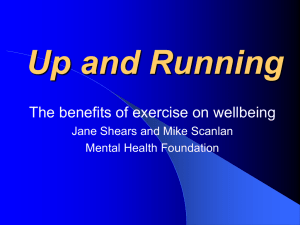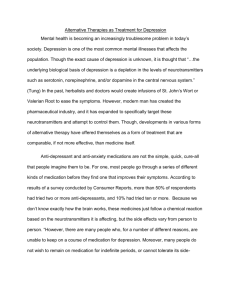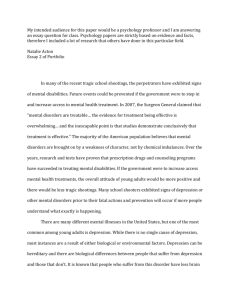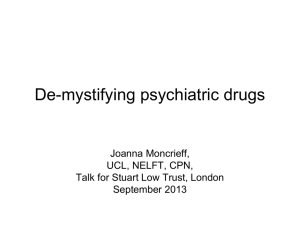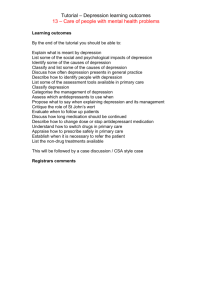link - Royal College of Psychiatrists
advertisement
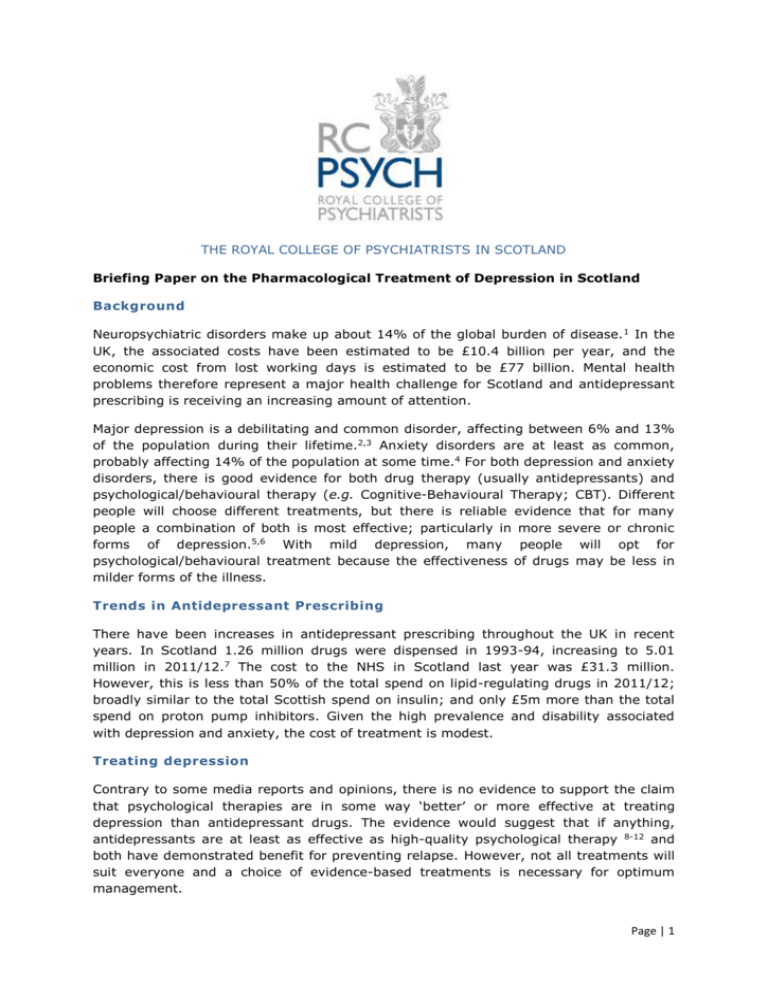
THE ROYAL COLLEGE OF PSYCHIATRISTS IN SCOTLAND Briefing Paper on the Pharmacological Treatment of Depression in Scotland Background Neuropsychiatric disorders make up about 14% of the global burden of disease. 1 In the UK, the associated costs have been estimated to be £10.4 billion per year, and the economic cost from lost working days is estimated to be £77 billion. Mental health problems therefore represent a major health challenge for Scotland and antidepressant prescribing is receiving an increasing amount of attention. Major depression is a debilitating and common disorder, affecting between 6% and 13% of the population during their lifetime.2,3 Anxiety disorders are at least as common, probably affecting 14% of the population at some time.4 For both depression and anxiety disorders, there is good evidence for both drug therapy (usually antidepressants) and psychological/behavioural therapy (e.g. Cognitive-Behavioural Therapy; CBT). Different people will choose different treatments, but there is reliable evidence that for many people a combination of both is most effective; particularly in more severe or chronic forms of depression.5,6 With mild depression, many people will opt for psychological/behavioural treatment because the effectiveness of drugs may be less in milder forms of the illness. Trends in Antidepressant Prescribing There have been increases in antidepressant prescribing throughout the UK in recent years. In Scotland 1.26 million drugs were dispensed in 1993-94, increasing to 5.01 million in 2011/12.7 The cost to the NHS in Scotland last year was £31.3 million. However, this is less than 50% of the total spend on lipid-regulating drugs in 2011/12; broadly similar to the total Scottish spend on insulin; and only £5m more than the total spend on proton pump inhibitors. Given the high prevalence and disability associated with depression and anxiety, the cost of treatment is modest. Treating depression Contrary to some media reports and opinions, there is no evidence to support the claim that psychological therapies are in some way ‘better’ or more effective at treating depression than antidepressant drugs. The evidence would suggest that if anything, antidepressants are at least as effective as high-quality psychological therapy 8-12 and both have demonstrated benefit for preventing relapse. However, not all treatments will suit everyone and a choice of evidence-based treatments is necessary for optimum management. Page | 1 In most studies of depression in primary care, the biggest concern is not over diagnosis of depression but under-diagnosis.13-15 Both represent contemporary challenges in healthcare. The importance of recognising and effectively treating depression is reflected in this being one of the few interventions that have reliably been shown to reduce suicide at a population level.16 There isn’t any good evidence that the prevalence (i.e. how many people have a condition at any given time) of depression has been increasing significantly over the last 10 years.17-19 People are worried about increasing rates of use of antidepressant drugs but it is important to recognise that rates of prescription for all psychiatric (and neurological) drugs has been going up at broadly similar rates. This probably reflects better recognition of such conditions, greater help-seeking, and a willingness to prescribe effective treatments when appropriate. Understanding Trends in Prescribing In the case of antidepressants, it is relevant that antidepressants can be used to treat pain, anxiety, incontinence, and migraines; and increases in antidepressant use doesn’t necessarily mean that they are being used to over-treat depression. We lack reliable data to indicate exactly what the drugs are being used for and up until recently we can only count the total amounts of antidepressants being dispensed. A number of studies in recent years have confirmed what many people have long suspected: that increasing prescription of antidepressants reflects a change in usage (from tricyclic antidepressants to newer SSRIs) and patients receiving longer prescriptions. Both of these changes are in line with current best-practice and evidencebased guidelines.20 Rather than more people getting drugs, a similar number of people are getting the drugs for longer. 21 One person taking an antidepressant for six months is a doubling in antidepressant prescribing compared to three people taking the drug for one month. Whilst some are concerned that the effectiveness of antidepressants is low, the effectiveness of antidepressants to prevent further episodes of depression is much higher.22 For some people, continuing to take the drugs after getting better is an important part of remaining well. Antidepressants and Psychological Therapies Many people are worried that GPs are prescribing antidepressants simply because they don’t have access to psychological therapies. When people have looked at detail at this, there isn’t much evidence to support such an assumption.23 Further, greater availability of psychological therapies doesn’t seem to reduce the rates of antidepressant prescribing;24,25 One recent study found that antidepressant prescribing increased as psychological therapy programmes were introduced.26 This probably reflected better recognition of common mental health disorders and importantly, such treatments tend to be complementary rather than in competition with each other. A number of psychological therapies have been shown to be effective for the treatment of depression and most of these are available in Scotland. However, Scotland’s capacity to deliver these in sufficient quantity and intensity shows regional variation, and there is more to be done to develop a workforce able to deliver skilled psychological therapy where it is needed. The development of the ‘Matrix’ 27 is a helpful step in supporting NHS Boards to develop capacity and expertise in psychological and behavioural therapies and the commitments to reducing the waiting times for such therapy will benefit patients. Page | 2 The Royal College of Psychiatrists in Scotland recognises the workforce implications for a range of professions in ensuring that high-quality and high-fidelity psychological therapy is embedded in Scottish mental health services. Importantly, the skills for doing this do not lie within any one discipline and partners need to work together to increase capacity and build expertise. The third sector is an important source of less intense interventions and preventative approaches to mental health. Conclusions Few people would argue against the value of the greater availability of high-quality psychological/behavioural therapies delivered by skilled therapists. The College supports the commitment to reduce waiting times for psychological therapies in the Mental Health Strategy as part of a national strategy to widen access to evidence-based psychological therapies. Alongside this, the use of antidepressants continues to be an evidence-based treatment for a common disorder which is entirely appropriate for many people who are disabled by their symptoms, and the use of drugs may actually increase the effectiveness of other treatments by reducing someone’s symptoms to a level at which they can fully engage with other therapies. References 1. 2. 3. 4. 5. 6. 7. 8. 9. 10. Prince M, Patel V, Saxena S, Maj M, Maselko J, Phillips MR, Rahman A. No health without mental health. The Lancet 2007; 370: 859-877. Waraich P, Goldner EM, Somers JM, Hsu L. Prevalence and incidence studies of mood disorders: a systematic review of the literature. Can J Psychiatry 2004; 49: 124-138. Hasin DS, Goodwin RD, Stinson FS, Grant BF. Epidemiology of Major Depressive Disorder: Results from the National Epidemiologic Survey on Alcoholism and Related Conditions. Arch Gen Psychiatry 2005; 62: 1097-1106. Alonso J, Angermeyer MC, Bernert S, Bruffaerts R, Brugha TS, Bryson H, de Girolamo G, Graaf R, Demyttenaere K, Gasquet I, Haro JM, Katz SJ, Kessler RC, Kovess V, Lepine JP, Ormel J, Polidori G, Russo LJ, Vilagut G, Almansa J, Arbabzadeh-Bouchez S, Autonell J, Bernal M, Buist-Bouwman MA, Codony M, Domingo-Salvany A, Ferrer M, Joo SS, Martinez-Alonso M, Matschinger H, Mazzi F, Morgan Z, Morosini P, Palacin C, Romera B, Taub N, Vollebergh WA. Prevalence of mental disorders in Europe: results from the European Study of the Epidemiology of Mental Disorders (ESEMeD) project. Acta Psychiatr Scand 2004; 109: 21-27. De Maat SM, Dekker J, Schoevers RA, de Jonghe F. Relative efficacy of psychotherapy and combined therapy in the treatment of depression: A metaanalysis. Eur Psychiatry 2007; 22: 1-8. Hollon SD, Jarrett RB, Nierenberg AA, Thase ME, Trivedi M, Rush AJ. Psychotherapy and Medication in the Treatment of Adult and Geriatric Depression: Which Monotherapy or Combined Treatment? J Clin Psych 2005; 66: 455-468. Information Services Division. Prescribing & Medicines: Medicines for Mental Health - Financial Years 2002/03 to 2011/12. NHS Scotland, 2012. Fountoulakis KN, Möller H-J. Efficacy of antidepressants: a re-analysis and reinterpretation of the Kirsch data. Int J Neuropsychopharm 2011; 14: 405-412. Fournier JC, DeRubeis RJ, Hollon SD, Dimidjian S, Amsterdam JD, Shelton RC, Fawcett J. Antidepressant Drug Effects and Depression Severity: A Patient-Level Meta-analysis. JAMA 2010; 303: 47-53. Kirsch I, Deacon BJ, Huedo-Medina TB, Scoboria A, Moore TJ, Johnson BT. Initial Severity and Antidepressant Benefits: A Meta-Analysis of Data Submitted to the Food and Drug Administration. PLoS Medicine 2008; 5: e45. Page | 3 11. 12. 13. 14. 15. 16. 17. 18. 19. 20. 21. 22. 23. 24. 25. 26. 27. Leucht S, Hierl S, Kissling W, Dold M, Davis JM. Putting the efficacy of psychiatric and general medicine medication into perspective: review of meta-analyses. Br J Psychiat 2012; 200: 97-106. Cuijpers P, van Straten A, Bohlmeijer E, Hollon SD, Andersson G. The effects of psychotherapy for adult depression are overestimated: a meta-analysis of study quality and effect size. Psychol Med 2010; 40: 211-223. Freeling P, Rao BM, Paykel ES, Sireling LI, Burton RH. Unrecognised depression in general practice. BMJ 1985; 290: 1880-1883. Mitchell AJ, Vaze A, Rao S. Clinical diagnosis of depression in primary care: a meta-analysis. The Lancet 2009; 374: 609-619. Rost K, Zhang M, Fortney J, Smith J, Coyne J, Richard Smith G. Persistently poor outcomes of undetected major depression in primary care. Gen Hosp Psych 1998; 20: 12-20. Mann JJ, Apter A, Bertolote J, Beautrais A, Currier D, Haas A, Hegerl U, Lonnqvist J, Malone K, Marusic A, Mehlum L, Patton G, Phillips M, Rutz W, Rihmer Z, Schmidtke A, Shaffer D, Silverman M, Takahashi Y, Varnik A, Wasserman D, Yip P, Hendin H. Suicide prevention strategies: a systematic review. JAMA 2005; 294: 2064-2074. Moore M, Yuen HM, Dunn N, Mullee MA, Maskell J, Kendrick T. Explaining the rise in antidepressant prescribing: a descriptive study using the general practice research database. BMJ 2009; 339: b3999. Murphy JM, Laird NM, Monson RR, Sobol AM, Leighton AH. A 40-Year Perspective on the Prevalence of Depression: The Stirling County Study. Arch Gen Psychiatry 2000; 57: 209-215. Munoz-Arroyo R, Sutton M, Morrison J. Exploring potential explanations for the increase in antidepressant prescribing in Scotland using secondary analyses of routine data. Br J Gen Pract 2006; 56: 423-428. National Institute for Health and Clinical Excellence. Depression: the treatment and management of depression in adults (CG90). National Collaborating Centre for Mental Health, 2009. Lockhart P, Guthrie B. Trends in primary care antidepressant prescribing 19952007: a longitudinal population database analysis. Br J Gen Pract 2011; 61: e565-e572. Geddes JR, Carney SM, Davies C, Furukawa TA, Kupfer DJ, Frank E, Goodwin GM. Relapse prevention with antidepressant drug treatment in depressive disorders: a systematic review. Lancet 2003; 361: 653-661. Cameron IM, Lawton K, Reid IC. Appropriateness of antidepressant prescribing: an observational study in a Scottish primary-care setting. Br J Gen Pract 2009; 59: 644-649. Robinson P. Depression, ethnicity and talking therapy. HSJ Intelligence (5 February 2009) 2009: 9. Williams C, Wilson P, Morrison J, McMahon A, Andrew W, Allan L, McConnachie A, McNeill Y, Tansey L. Guided Self-Help Cognitive Behavioural Therapy for Depression in Primary Care: A Randomised Controlled Trial. PLoS ONE 2013; 8: e52735. de Lusignan S, Chan T, Parry G, Dent-Brown K, Kendrick T. Referral to a new psychological therapy service is associated with reduced utilisation of healthcare and sickness absence by people with common mental health problems: a before and after comparison. J Epidemiol Community Health 2012; 66: e10. NHS Education for Scotland. Mental Health in Scotland: A Guide to delivering evidence-based Psychological Therapies in Scotland - The Matrix 2011. Scottish Government, 2011. Page | 4
